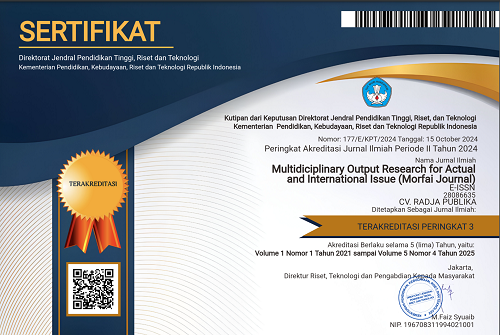JURIDICAL ANALYSIS OF THE HIGH CRIMINAL ACTIONS OF CHILD ABUSE CASES IN THE FRAMEWORK OF IMPLEMENTING JUSTICE IN INDONESIA AS A LEGAL COUNTRY (CASE STUDY IN ANAMBAS ISLANDS DISTRICT)
Main Article Content
Syafrudin Semidang Sakti
Fadlan
Erniyanti
Agus Siagian
Obscenity is one of the sexual crimes resulting from changes that have occurred in the structure of our society. Sexual abuse is a type of crime that has a very bad impact, especially on the victims, because sexual abuse violates human rights and can damage human dignity, especially the soul, mind and offspring. The victims in these crimes are often children. The increase in criminal acts of sexual abuse committed by children occurred in Anambas Islands Regency in 2020 by 5 cases, then in 2021 there were 6 cases, in 2022 there were 7 cases, and in 2023 there was 1 case. The problems in this research are First; What is the legal regulation of criminal acts of sexual abuse against children in Indonesia?; Second: How is the implementation of the high level of criminal acts of sexual abuse against children in the context of upholding justice in Indonesia as a rule of law (case study in Anambas Islands Regency)?; Third: What factors are obstacles or obstacles and efforts to eradicate the high level of criminal acts of sexual abuse against children in the context of upholding justice in Indonesia as a rule of law? This research uses a descriptive method with normative and sociological research types using a normative approach (legal research) to obtain primary data through field research (research). The research results show that First; The legal regulation of criminal acts of sexual abuse against children in Indonesia is to impose a crime below a special minimum, the judge has deviated from the Child Protection Law which regulates the provisions for minimum sanctions that have been regulated for each special crime; Second; Implementation of the High Crime of Child Abuse Cases in the Context of Upholding Justice in Indonesia as a Rule of Law State (Case Study in Anambas Islands Regency); In accordance with the rules in Article 7 paragraph (2) of Law Number 11 of 2012 concerning the Juvenile Criminal Justice System. that diversion can only be given to children who have committed a crime with a prison sentence of less than 7 (seven) years and is not a repetition of the crime. Meanwhile, in the case of sexual abuse, perpetrators of criminal acts are subject to imprisonment for a maximum of 15 (fifteen) years, therefore diversion cannot be applied to children who commit criminal acts of sexual abuse. Third: Factors that become Obstacles or Obstacles and Efforts in Eradicating the High Rate of Criminal Offenses Cases of Child Abuse in the Context of Upholding Justice in Indonesia as a State of Law are the presence of factors such as (1) Factors of Legal Rules and Legislation; (2) Factors of Law Enforcement Officials; (3) Supporting Facilities or Facilities Factors; (4) Community Factors; (5) Cultural Factors.
Achmad Ali, Revealing Legal Theory and Judicial Theory, Prenada Media Group, Jakarta, 2012
Ahmad AK Muda, Complete Indonesian Dictionary, Reality Publishers, Jakarta, 2016
Andi Hamzah, Indonesia's Criminal and Sentencing System from retribution to reform. Pradnya Paramita, 2015
Bambang Sutiyoso, Legal Discovery Method, UII Press, Yogyakarta, 2016
Carl Joachim Friedrich, Historical Perspective Legal Philosophy, Bandung: Nuansa and Nusamedia, 2014
Darsono P, Karl Marx Political Economy and Revolutionary Action, Diadit Media, Jakarta, 2016
Darji Darmodiharjo & Shidarta, Principles of Legal Philosophy, What and How is Indonesian Legal Philosophy, PT Gramedia Pustaka Utama, Jakarta, 2015
Darsono P, Karl Marx Political Economy and Revolutionary Action, Diadit Media, Jakarta, 2016
Hans Kelsen, General Theory of Law and State, translated by Rasisul Muttaqien, Bandung, Nusa Media, 2012
John Rawls, A Theory of Justice, London: Oxford University press, 1973, which has been translated into Indonesian by Uzair Fauzan and Heru Prasetyo, Theory of Justice, Yogyakarta: Student Library, 2016
LJ van Apeldoorn, introduction to legal science, PT Pradnya Paramita, Jakarta, 2018
The Mix Legal System is a combination of several legal systems which can be seen in its implementation enforcing legislation (Continental Europe), Customary Law, Islamic Law (Muslim Law System), and Jurisprudence (Common Law)
Romli Atmasasmita, Integrative Legal Theory Reconstruction of Developmental Legal Theory and Progressive Legal Theory, Yogyakarta: Genta Publishing, 2012
R. Soeroso, Introduction to Legal Studies, Jakarta: Sinar Graphics, 2019
Shidarta, Characteristics of legal reasoning in the Indonesian context, Legal reasoning in the context of Indonesia. Bandung: CV Utomo, 2016
F. Budi Hardiman, Public Space: Tracking "Democratic Participation" from Polis to Cyberspace, Yogyakarta: Kanisius Publishers, 2019
Sudikno Mertokusumo, Legal Discovery An Introduction, Yogyakarta, Liberty, 2018
_________________ and A. Pitlo, Chapters on Legal Discovery, Bandung, Citra Aditya Bakti, 2013
_________________. Legal Discovery Methods, Jakarta, Reality Publishers, 2017
Sugiyono. Quantitative Qualitative Research Methods And R&D. Bandung: Alfebeta, 2012
Wirjono Prodjodikoro, Principles of Criminal Law in Indonesia, Bandung; PT. Refika Aditama, 2018
Constitution of the Republic of Indonesia
Law Number 4 of 1979 concerning Child Welfare
Law Number 23 of 2002 concerning Child Protection
Law Number 11 of 2012 concerning the Juvenile Criminal Justice System
Criminal Code (KUHP)
Criminal Procedure Code (KUHAP)]
Government Regulation Number 70 of 2020 concerning Procedures for Implementing Chemical Castration, Installation of Electronic Detection Devices, Rehabilitation, and Announcement of the Identity of Perpetrators of Sexual Violence Against Children
https://id.wikipedia.org/wiki/perlindungan Hukum,
http://www.pengertianpakar.com/2015/03/pengertian-praperadilan.html#,









